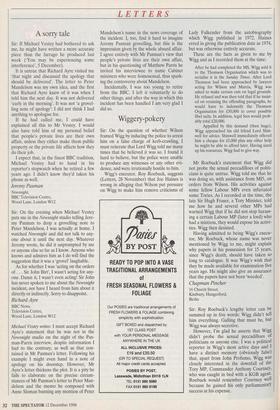Wiggery-pokery
Sir: On the question of whether Wilson framed Wigg by inducing the police to arrest him on a false charge of kerb-crawling, I must reiterate that Lord Wigg told me many times that he believed it was so. I found it hard to believe, but the police were unable to produce any witnesses or any other evi- dence, and were irrationally hostile to him.
Wigg's executor, Roy Roebuck, suggests (Letters, 28 November) that Joe Haines is wrong in alleging that Wilson put pressure on Wigg to make him remove criticisms of Lady Falkender from the autobiography which Wigg published in 1972. Haines erred in giving the publication date as 1974, but was otherwise entirely accurate.
These are the facts as given to me by Wigg and as I recorded them at the time:
After he had completed the MS, Wigg sold it to the Thomson Organisation which was to serialise it in the Sunday Times. After Lord Thomson had been approached by lawyers acting for Wilson and Marcia, Wigg was asked to make certain cuts on legal grounds. He refused and was then told that if he insist- ed on retaining the offending paragraphs, he would have to indemnify the Thomson Organisation for £50,000 to cover possible libel suits. In addition, legal fees would prob- ably total £20,000.
Appalled by this demand (then huge), Wigg approached his old friend Lord Shin- well for advice. Shinwell immediately offered him a cheque for £5,000 plus any other help he might be able to afford later. Having sized up his resources, Wigg had to give way.
Mr Roebuck's statement that Wigg did not probe the sexual peccadilloes of politi- cians is quite untrue. Wigg told me that he was doing so, with assistance from MI5, on orders from Wilson. His activities against some fellow Labour MPs even infuriated some Tories. As I recorded at the time, the late Sir Hugh Fraser, a Tory Minister, told me how he and several other MPs had warned Wigg that if he did not stop harass- ing a certain Labour MP (later a lord) who had a mistress, they would expose his activi- ties. Wigg then desisted.
Having admitted to being Wigg's execu- tor, Mr Roebuck, whose name was never mentioned by Wigg to me, might explain why papers in his possession for 15 years, since Wigg's death, should have taken so long to catalogue. It was Wigg's wish that they be made available for examination five years ago. He might also give an assurance that the papers have not been 'weeded'. Chapman Pincher
16 Church Street, Kintbury, Hungerford, Berks










































































 Previous page
Previous page